RVing and good times are a given. Unfortunately, so is the dirty job of dumping your RV holding tanks.
By default, all but the most high-end RVs come equipped to remove waste with a standard 3″ Stinky Slinky hose like the one Cousin Eddie made famous in the movie National Lampoon’s Christmas Vacation.
But if you want a better way of dumping your waste tanks, RV macerators are the way to go.
Do you think of this guy when you dump your RV tanks?
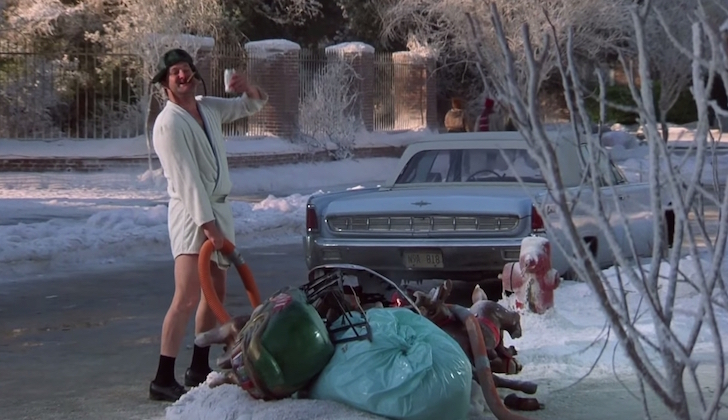
What do RV macerators do?
RV macerators are similar to a standard kitchen sink garbage disposal unit. In fact, this industrious DIYer made his own RV macerator from a rebuilt sink disposal.
RV macerators grind up waste like kitchen sink disposers.
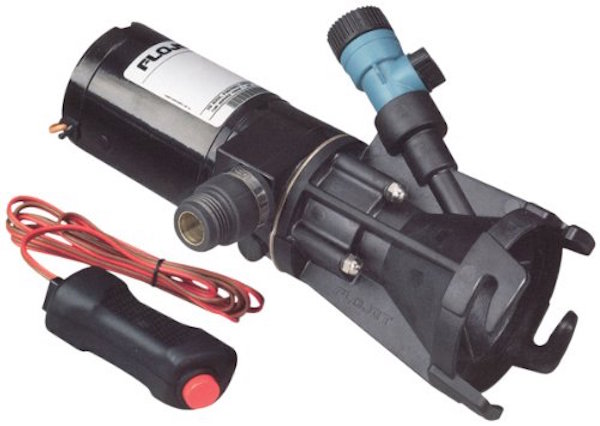
RV macerators are motorized grinders that turn your black tank solids and liquids into a slurry that can drain longer distances through a much smaller sewer hose—even through a common 1” garden hose.
And because an electric pump does the hard work instead of gravity, you can even move waste to uphill drain locations.
Why install an RV macerator?
For starters, an RV macerator hose is less unsightly than the standard Stinky Slinky.
You hardly notice them at all when you’re parked in one spot. And because macerated sewage is smaller in mass as it travels out of your RV, there’s less smell permeating the air around you.
Finally on a practical note, motorized RV macerators come in handy because you have more options for dumping your holding tanks. For instance, you can dump at an ordinary sticks-and-bricks home.
So if your RV is usually parked in your driveway and you never seem to have a convenient place to stop and empty your tanks after camping trips, the RV macerator hose can tie into your home’s sewer system.
Be aware though that some municipalities may not allow this, so be sure you won’t get a ticket if you dump at home through a residential sewer.
Small hoses on RV macerators let you dump anywhere (…anywhere that’s legal, of course).
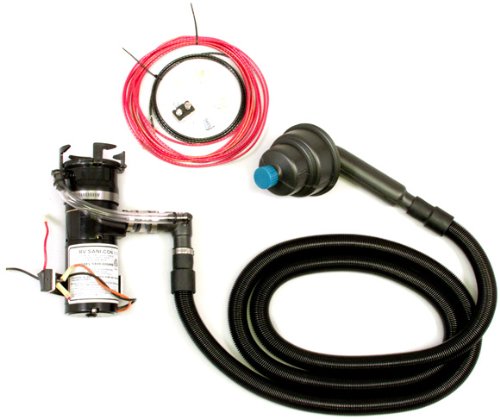
What do RV macerators cost?
A good RV macerator pump will serve you well but don’t expect to pay less than $200 for the pump. You can buy a whole system for about $300 and install it yourself.
Add a couple hundred dollars if you have a RV service center do the job for you.
Where can you get RV macerators?
RV service centers are happy to install RV macerator units. Because RV plumbing is inconsistent across all brands and models, matching up an RV macerator pump to your RV plumbing system can be tricky.
But if you’re a DIYer and confident tackling minor plumbing and electrical jobs, you can purchase RV macerator systems on Amazon and make the upgrade yourself!
Ready to install an RV macerator system yourself?
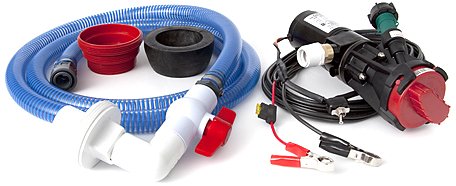
If you’ve installed your own RV macerator system, let us know, we’d love to hear how it went!



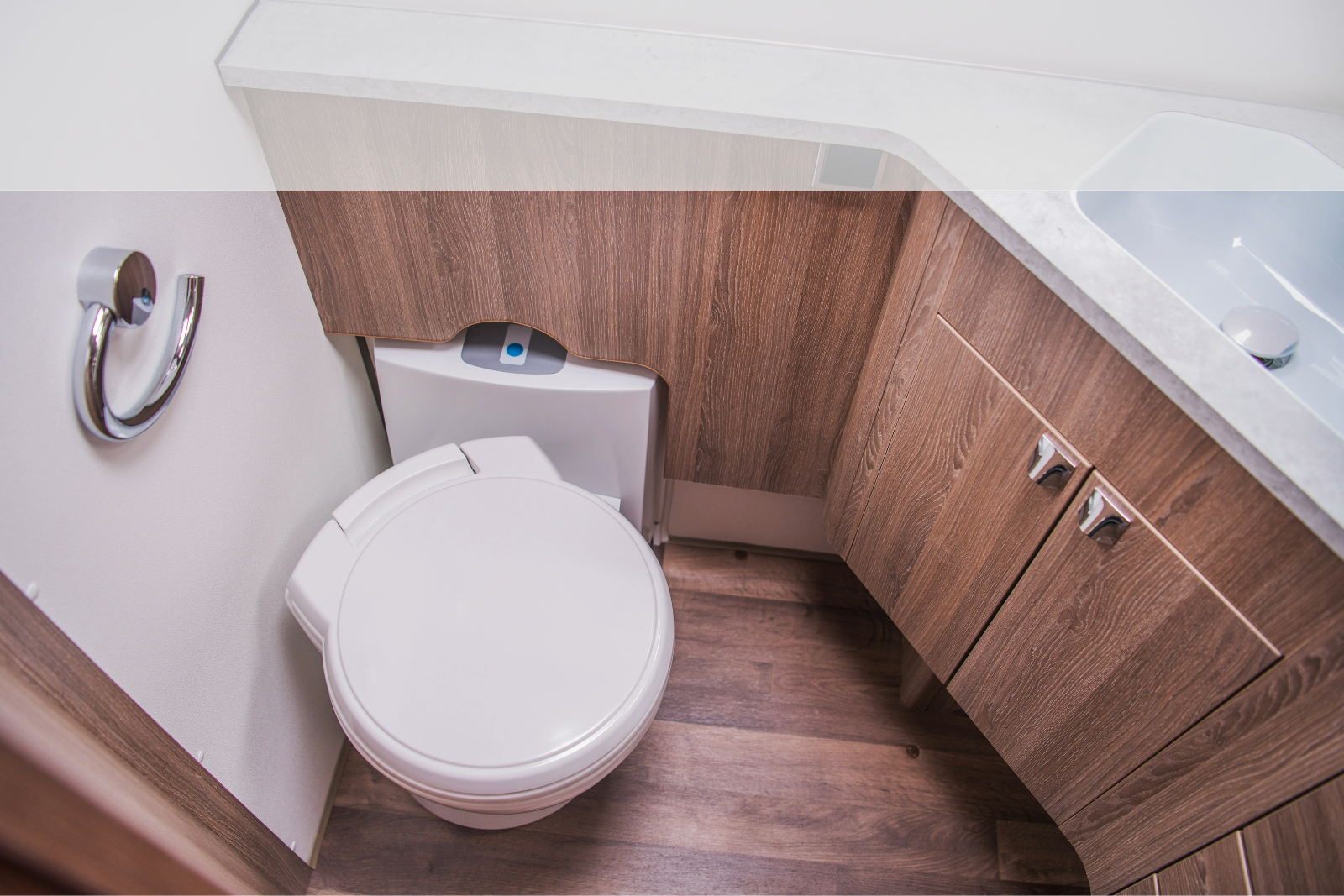
Seems to be a “solution that is looking for a problem”. Now if it someone would invent one that would clean and sanitize the discharge so that it could be dumped anywhere, that would be awesome!
Is there a check valve in the system?
I have used a macerator pump for years to empty my tanks when I got home. I found it to be much better than waiting in a line at a dump station. I installed a system in my new motorhome because I heard from many users that is was the way to go.
On our first long stay in south Texas, I found it to be useless! It takes about 20 minutes to empty both holding tanks, and the noise disturbs the neighbors. It really upsets other campers when they have to wait 20 minutes or longer, for someone to pump their tanks at a dump station, when a full size hose can do the job in 5 minutes. I have now modified my system so that I use a full size hose for dumping at campgrounds or dump stations, and the macerator when I need to dump at home.
The pumps seem to be a great idea, but not so much! Although, I would NOT be without one! There are many times when dumping at home is the only answer. I modified my plumbing at home and added a drain line to the outside, near where I park my motorhome. This makes it easier than trying to find a dump station.
Jack, I am looking at one of these pumps and my solution will be to use my 20′ long 2/0 jumper cables to power the pump. I’ll start my RV engine and connect to the chassis battery. In a trailer, you could just connect to your house batteries using jumper cables. Bill
I understand the human urge to try to find better mousetraps, and the satisfaction some might derive from being able to flush uphill. But really, what is the practical benefit gained from a macerator? They often do not work smoothly, they get clogged, often needing to be opened up and cleaned. Ever had one go out in the middle of a dump? Not a simple solution to that. All for what? Seems to me thay are much more hassle than they are worth. But, then I’m old fashioned. I’m patient. I can wait till my 3 inch hose dumpd everything. And, I don’t need to feel priveledged by having fancy toys.
Where can we read more about “marine-directed systems”? And how about a system that would connect where the stinky slinky does, and uses 110 from campsite power post or RV outlet?
We use our flo-jet when parked at the in-laws and love it. It pumps 75’ to the house cleanout with no problem. But I still prefer the valves and slinky when parked at sites with a sewer connection. We can leave the gray water valve open for extended periods. A “T” connection down steam of the black/gray valves might be an option, with the traditional slinky connection on one outlet and the macerator on the other.
Using marine-directed systems works just as well, for about half the cost.